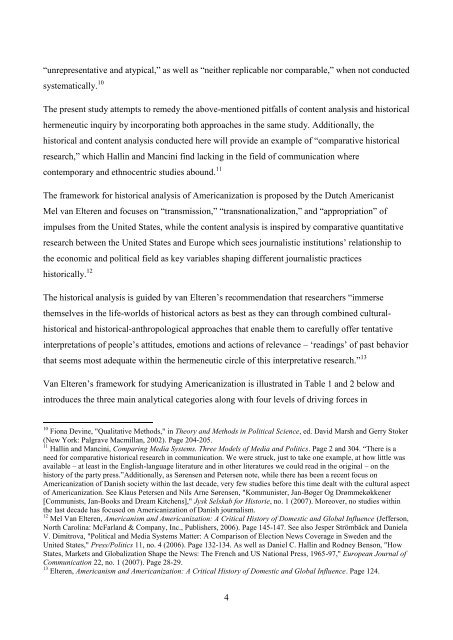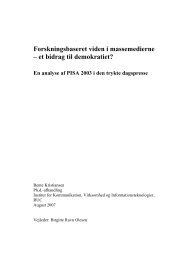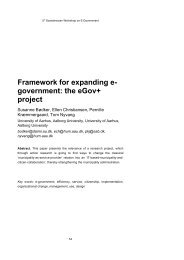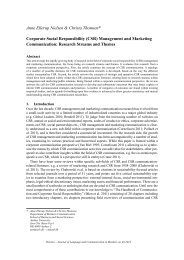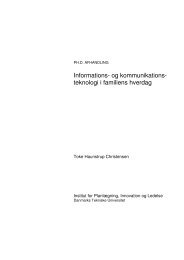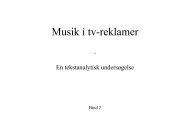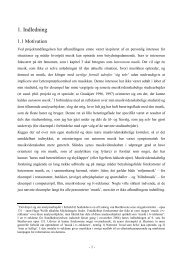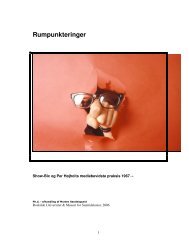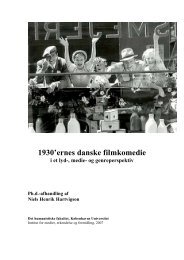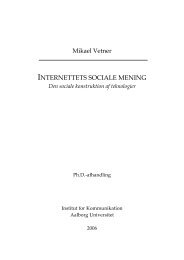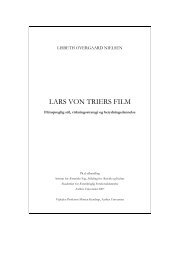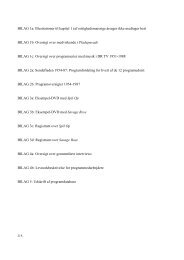The Jeremiad Over Journalism
The Jeremiad Over Journalism
The Jeremiad Over Journalism
Create successful ePaper yourself
Turn your PDF publications into a flip-book with our unique Google optimized e-Paper software.
―unrepresentative and atypical,‖ as well as ―neither replicable nor comparable,‖ when not conducted<br />
systematically. 10<br />
<strong>The</strong> present study attempts to remedy the above-mentioned pitfalls of content analysis and historical<br />
hermeneutic inquiry by incorporating both approaches in the same study. Additionally, the<br />
historical and content analysis conducted here will provide an example of ―comparative historical<br />
research,‖ which Hallin and Mancini find lacking in the field of communication where<br />
contemporary and ethnocentric studies abound. 11<br />
<strong>The</strong> framework for historical analysis of Americanization is proposed by the Dutch Americanist<br />
Mel van Elteren and focuses on ―transmission,‖ ―transnationalization,‖ and ―appropriation‖ of<br />
impulses from the United States, while the content analysis is inspired by comparative quantitative<br />
research between the United States and Europe which sees journalistic institutions‘ relationship to<br />
the economic and political field as key variables shaping different journalistic practices<br />
historically. 12<br />
<strong>The</strong> historical analysis is guided by van Elteren‘s recommendation that researchers ―immerse<br />
themselves in the life-worlds of historical actors as best as they can through combined cultural-<br />
historical and historical-anthropological approaches that enable them to carefully offer tentative<br />
interpretations of people‘s attitudes, emotions and actions of relevance – ‗readings‘ of past behavior<br />
that seems most adequate within the hermeneutic circle of this interpretative research.‖ 13<br />
Van Elteren‘s framework for studying Americanization is illustrated in Table 1 and 2 below and<br />
introduces the three main analytical categories along with four levels of driving forces in<br />
10 Fiona Devine, "Qualitative Methods," in <strong>The</strong>ory and Methods in Political Science, ed. David Marsh and Gerry Stoker<br />
(New York: Palgrave Macmillan, 2002). Page 204-205.<br />
11 Hallin and Mancini, Comparing Media Systems. Three Models of Media and Politics. Page 2 and 304. ―<strong>The</strong>re is a<br />
need for comparative historical research in communication. We were struck, just to take one example, at how little was<br />
available – at least in the English-language literature and in other literatures we could read in the original – on the<br />
history of the party press.‖Additionally, as Sørensen and Petersen note, while there has been a recent focus on<br />
Americanization of Danish society within the last decade, very few studies before this time dealt with the cultural aspect<br />
of Americanization. See Klaus Petersen and Nils Arne Sørensen, "Kommunister, Jan-Bøger Og Drømmekøkkener<br />
[Communists, Jan-Books and Dream Kitchens]," Jysk Selskab for Historie, no. 1 (2007). Moreover, no studies within<br />
the last decade has focused on Americanization of Danish journalism.<br />
12 Mel Van Elteren, Americanism and Americanization: A Critical History of Domestic and Global Influence (Jefferson,<br />
North Carolina: McFarland & Company, Inc., Publishers, 2006). Page 145-147. See also Jesper Strömbäck and Daniela<br />
V. Dimitrova, "Political and Media Systems Matter: A Comparison of Election News Coverage in Sweden and the<br />
United States," Press/Politics 11, no. 4 (2006). Page 132-134. As well as Daniel C. Hallin and Rodney Benson, "How<br />
States, Markets and Globalization Shape the News: <strong>The</strong> French and US National Press, 1965-97," European Journal of<br />
Communication 22, no. 1 (2007). Page 28-29.<br />
13 Elteren, Americanism and Americanization: A Critical History of Domestic and Global Influence. Page 124.<br />
4


